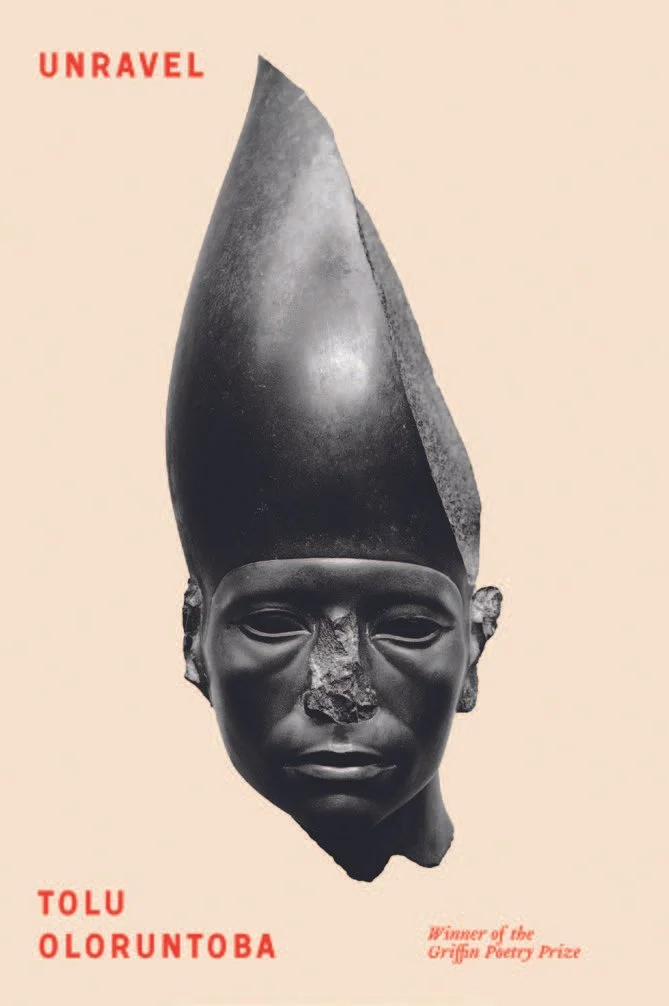Unravel
Unravel
By Tolu Oloruntoba
Penguin Random House, 2025; 120 pages; $22.95
Reviewed by Kevin Spenst
If your brain lights up when discovering a new word, any perlustration of Nigerian-Canadian poet and physician Tolu Oloruntoba’s third book of poetry may very well result in rays of light coming out of your ears and nostrils. Unravel is not always an easy read, but it’s so expertly bolted down in poetic devices, methods, and forms that even if you’re unfamiliar with some of the vocabulary, the lines and stanzas scintillate in well-crafted assemblages. Most importantly, the subject matter tackled is vast and deep and demands a diction as wide-ranging as the poet’s concerns and curiosities. In any case, we’re reassured “My gospel of roguishness, // disruption and attention, will not harm you.”
Part of the disruption of Unravel might be its cavalcade of unanswerable questions and conditionals. The first poem “Re- claim” is built out of agnostic tension. The voice of the poem is a city “falling into the sea,” who admits its dwellers (framed as believers “singing in the cathedrals”) have misplaced their trust. After three lines beginning with ‘if’ clauses and including two ‘whys,’ the poem concludes “I haven not revealed myself.”
Throughout the entire book, ‘ifs’ (totalling 52), and ‘whys’ (17), are used to imaginatively question the language of science, history, and economics to explore their influence on our lives. The questions are often centered on suffering and cruelty. In “My Father’s Fear of Death Calls Me at 2 am His Time,” the speaker states, “My name is Renounce. To suborn a prophet’s fervor has been my work. And here are the only three poems I ever wrote: // 1. God, how could you? / 2. Dad, how could you? /World, how could you?” This ability to compress so much into a single voice is one of the marvels of Unravel. What’s more, the voice is brutally honest. The next line in the previously mentioned poem declares “The revenge that I am grows old.”
Countering the weight of existential quandaries and the conflicts of late-stage capitalism, a solidarity with others runs throughout the forty-two poems in the collection. In “Contronym”: “when I grow up I want to be / a choking hazard: one of the small / people clogging the airway of dominion.” Despite the Babel tower scenario set up in the poem (which also establishes a theme of city life and civilization throughout the book), there is the conviction to communicate with others for we “only ever solved / the large problems in assembly.” Greek and Latin are used in this poem; other languages appear in others. “Demonstro” drops Portuguese and German (with both words standing for ‘longing’): “And because / long is never satisfied, it takes a village / away, to have ours be so vulgar. / Saudade, sehnsucht are beautiful / only in theory.” A few lines later, the writer points out beautifully “And we found belonging to be / the only bandage for longing.”
What I love most about Unravel is how big thinking (‘Scientists found the four words / at the core of all our language: / “GOOD” “WANT” “BAD” “LOVE”’) sits next to vulnerability and tenderness. One of the last poems in the collection is “Iyéwándé.” In a The Tyee interview with Fiona Tinwei Lam, Oloruntoba explains that in the Yorùbá tradition “People name a child after a departed relative in the belief that they are an incarnation of the deceased, or to memorialize them. Iyéwándé is one of such names.” The poem is a tender litany of promises: “I will hold her hand and teach her to walk. / I will tell her what unfamiliar words mean. / I will kiss her on the cheek.” Here we have a new father who later writes “I keep seeing my unmourned grandmother’s / face in hers.” Whatever the difficulties of our world, they have been here for thousands of years and just as our ancestors helped us through in the past, so too will they be our strength in our future.
As for the role of the writer, Oloruntoba writes in “Lethality” “Those who seize the means of means / must maintain them.” And the fight goes on.

